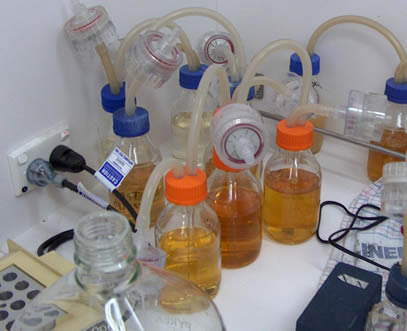|
GM
yeasts: the next battleground
 Iím going to make a
prediction. I reckon the next battleground in the wine world will be
the controversial use of genetically modified (GM) yeasts in
winemaking. Plenty of these genetically modified strains already exist
in laboratories around the globe, but they havenít previously been
commercialized because of the negative reactions of consumers to GM
food products. The scientists are busy engineering beneficial traits
into wine yeasts even though they know they wonít be useful for
commercial winemaking for the forseeable future, for two reasons.
First, they reckon the public oppisition to GM technology will one day
recede, at which point theyíll be in a good position to move.
Second, they can learn a lot of useful information from using these
introduced genes, which will then inform conventional breeding and
selection programs. Iím going to make a
prediction. I reckon the next battleground in the wine world will be
the controversial use of genetically modified (GM) yeasts in
winemaking. Plenty of these genetically modified strains already exist
in laboratories around the globe, but they havenít previously been
commercialized because of the negative reactions of consumers to GM
food products. The scientists are busy engineering beneficial traits
into wine yeasts even though they know they wonít be useful for
commercial winemaking for the forseeable future, for two reasons.
First, they reckon the public oppisition to GM technology will one day
recede, at which point theyíll be in a good position to move.
Second, they can learn a lot of useful information from using these
introduced genes, which will then inform conventional breeding and
selection programs.
Now, however, a GM yeast
strain, called ML01, has been commercialized and is authorized for use
in the USA. This yeast, made by Springer Oenologie, has been the
recipient of two extra genes (known as transgenes). The first is a
malate transporter gene from another yeast, Schizosaccharomyces
pombe, and the second is the malolactic enzyme gene from Oenococcus oeni, the main bacteria responsible for the natural
malolactic fermentation that occurs in many wines after alcoholic
fermentation. This yeast is therefore able to carry out malolactic
fermentation (normally done by bacteria) at the same time as alcoholic
fermentation.
There are several advantages
to this. The first is that processing wine becomes much faster. The
second is that there is less risk of wine spoilage because there is no
delay between alcoholic fermentation and the onset of malolactic
fermentation, a stage at which wine can be at risk. Also, the
resulting wine is less likely to contain biogenic amines which are
produced by the bacterial malolactic fermentation and which can have
negative health effects.
In the USA yeasts are
classified as processing agents, and thus wines made with this yeast
would need no declaration that they contained GM ingredients. This
allows GM yeast to enter winemaking Ďunder the radarí, with
consumers or advocacy groups none the wiser. In many other countries,
such as New Zealand and Australia, the regulations are more stringent,
and yeast is considered as part of the ingredients of wine.
So is anyone making wine
using this GM yeast? If they are, they arenít telling anyone, for
understandable reasons. In response to the commercial approval of ML01
in the USA, the Australian Wine Research Institute has issued a
statement declaring that no GM yeasts will be used in Australian wine
for the foreseeable future. But because it is so much easier to
produce yeasts with desirable properties by GM technology (and there
are some traits that are impossible to select for by conventional
breeding), research continues apace globally on GM yeast technology.
So whatís the big deal?
Arenít GM microbes used all the time? The insulin diabetics inject
is produced by GM bacteria, for example, and given proper testing,
thereís no reason to worry about safety issues. Supporters of the
technology argue that what they are doing by developing GM yeast
strains is not with the intention of creating fake wines, but with a
view to unlocking the latent flavour and aroma potential of grape must
by using yeasts with special properties. One yeast researcher has even
gone on record as stating that the best wines are still to be made,
and that this technology is one way forward.
What do I think? As a
scientist who cares a great deal about the future of wine, I favour a
cautious approach: if GM yeasts become widespread, the danger is that
wine will be seen as just another manufactured beverage. If we kill
the Ďnaturalnessí of wine, we run the risk of destroying the whole
venture. So although it rankles with me a bit to knock the elegant
science involved in engineering new wine yeasts, Iím afraid Iím
going to voice my disapproval at the use of GM yeasts in wine. I think
itís time we drew a line in the sand and banned the use of GM
organisms in winemaking.
see
also www.wine-science.com
Back to top
|

